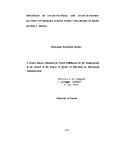| dc.description.abstract | The purpose of this study was to investigate the socio- cultural and socioeconomic factors influencing pupils' discipline in Primary schools in Kilifi District, Kenya. The study involved 78 head teachers and 418 standard 8 pupils from the district who were randomly selected to participate in the study. The study was guided by four objectives which looked into how pupils discipline is influenced by child labour, tourism practices, cultural ceremonies and child rearing practises. The study was guided by the Reinforcement theory by Skinner(1993).Descriptive survey design and data was collected through the use of questionnaires. Data of the study was both qualitative and quantitative. Qualitative was analysed using statistical packages for social sciences (SPSS).
The computed data was then presented using descriptive statistics. The study established that all the primary schools in Kilifi District experienced discipline problems, which were influenced by community socio-cultural and socio-economic activities. The study found out that staffing in the primary schools was gender imbalanced with more male head teachers 80% than female head teachers who were only 20%. The professional qualification of the head teachers was also noted to be low with most of them having PI certificates.
The study also revealed that the education level of the parents was low especially the mothers who majority of them 60.3% have managed up to primary level. The type of child activity which mostly influenced pupils' discipline was noted to be tapping of palm wine 34.4%. The study also noted 25% of the tourism activities along the beaches which made pupils' to sneak from school and home was entertaining of tourists . The study also found out that majority of the parents 72% are not bothered by their children sneaking out during the day or the night to attend ceremonies. The study also noted that absentism was the most discipline problem experienced in the primary schools.
The study also noted that majority of the head teachers 90.9% use disciplinary committees in dealing with discipline problems. The findings of the study also revealed that the major home based factor which influences pupils' discipline is unstable families 95.7%. The study recommended that Parents should embrace education of their children and be strict on the discipline of their children. The head teachers, teachers, pupils' and parents should work harmoniously and co-operate effectively on the discipline of children. The Ministry of Education should equip and strengthen guidance and counseling desks in the schools. | en_US |

